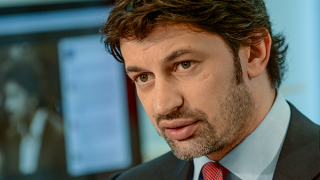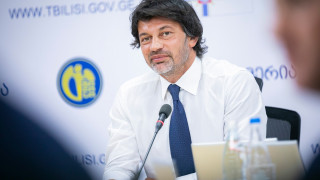On 12 December 2014, the so-called President of Occupied Abkhazia, Raul Khajimba, stated: "Up until now, we do not know whether or not we actually get that 40% of electricity which belongs to us according to the 60/40 percentage distribution scheme. We have to know precisely whether or not we are able to function under these conditions. The President, as the head of the executive government, together with the whole executive government itself has to elaborate respective measures to regulate the Inguri HPP ownership issue. This is a very difficult task and it cannot be accomplished very quickly but it is possible to bring this to a conclusion, once and for all. Everything which is on the territory of Abkhazia should belong to the people of Abkhazia."
The Minister of Energy and Natural Resources of Georgia, Kakha Kaladze, responded to that statement, saying: "There were cases when we encountered some problems in the distribution of electricity through the Inguri HPP and we had to purchase electricity from the Russian Federation which was very expensive. We supplied Abkhazia with Russian electricity to make sure that Abkhazia was not completely in darkness and, probably, we will do that in the future as well."
FactCheck took interest in Kakha Kaladze’s statement and verified its accuracy.
The Inguri HPP is the largest hydro power plant in Georgia. It was constructed between 1961 and 1978. It represents a complex of HPPs which includes the Inguri HPP proper and the Vardnili HPP. The Inguri dam is located in the district of Tsalenjikha in the vicinity of Daba Jvari whilst the power plant is located on the territory of the village of Saiberio which is in the occupied territory.
The Inguri HPP’s projected capacity reaches 4.5 billion kWh annually although due to hydrological conditions, its maximum capacity is, in fact, 4 billion kWh annually. The Inguri HPP produces 40%-45% of the total electricity generated in Georgia. Georgia’s total electricity consumption equals 8 billion kWh annually. After the Inguri HPP’s generated electricity is distributed according to the aforementioned 60/40 percentage ratio, the amount of electricity supplied to the rest of Georgia constitutes 25%-30% of its annual electricity consumption.
The President of Georgia’s National Academy of Energy, Revaz Arveladze, stated: "The machinery comprising the Inguri HPP is located in the village of Saiberio which is in the occupied territory of Abkhazia. Part of the electricity through the 500 kV electricity cable is being transmitted to Georgia and part of the electricity is given to the occupied territory through a 220 kV electricity cable. Approximately 15 years ago, a verbal agreement was reached to give 40% of the electricity generated by the Inguri HPP to Abkhazia and 60% to Georgia. In fact, Abkhazia should not be getting more than 10%. Even though 35% of the machinery running the HPP is located on their side, electricity is being generated by water from the Inguri River which flows on our side."
To obtain further information on the frequency of the problems at the Inguri HPP, the price of electricity imported from Russia and whether or not that electricity was, in fact, delivered to Abkhazia, FactCheck addressed the Ministry of Energy and Natural Resources of Georgia. According to an official letter sent to us by the Ministry, there is only one case when the Inguri HPP experienced any problems in distributing electricity in the period of 2013 to the present day and, moreover, this was only for a couple of hours.
According to the information obtained from the Ministry of Energy and Natural Resources, the following is the amount of electricity imported by the Government of Georgia from Russia and other neighbouring countries:
In regard to supplying the Abkhazian side with imported electricity, the Ministry issued a general statement: "Electricity purchased from the Russian Federation is delivered to the population of Abkhazia when respective necessity arises."
According to the Ministry’s information, all of the transactions related to the purchase of electricity are carried out by the commercial operator of the Georgian State Electric System. FactCheck addressed the Georgian State Electric System in order to obtain information on electricity prices. According to the reply we received, however, the price of imported electricity is confidential as requested by the contractor companies.
Conclusion
Since 2013, there has only been one case when the Inguri HPP experienced problems in distributing electricity. As concerns imported electricity, the bulk of it was imported from Russia both in 2013 and 2014. According to the information of the Ministry of Energy and Natural Resources, electricity purchased from Russia was delivered to the population of Abkhazia in the case of necessity. As previously mentioned, there has only been a single case when the Inguri HPP experienced a problem which could have caused this respective necessity (in 2013).
As concerns the price of imported electricity, this information is considered as confidential according to the commercial operator of the Georgian State Electric System which renders it impossible, therefore, to assess whether or not this part of Kakha Kaladze’s statement about the price of Russian electricity being very expensive is, in fact, true.
FactCheck concludes that Kakha Kaladze’s statement is MOSTLY TRUE.
|
Import |
From Russia |
From Azerbaijan |
From Armenia |
In Total (million kwt/h) |
|
2013 |
460.547 |
23.560 |
0.001 |
484.108 |
|
2014 |
607.0 |
184.2 |
2.1 |
793.3 |
Tags:








